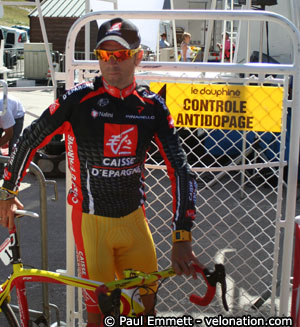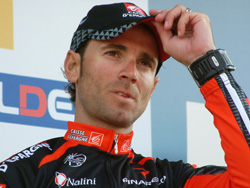 Choosing to follow the ‘attack is the best line of defence’ approach, Spanish rider Alejandro Valverde has blasted the UCI, CONI and others for their efforts to ban him in relation to Operación Puerto, and has suggested he could take legal action.
Choosing to follow the ‘attack is the best line of defence’ approach, Spanish rider Alejandro Valverde has blasted the UCI, CONI and others for their efforts to ban him in relation to Operación Puerto, and has suggested he could take legal action.
The Spaniard lost an appeal to CAS in relation to Italian Olympic Committee CONI’s two year ban on him racing in Italy, and is awaiting the results of a second CAS hearing. This is an appeal by the UCI and WADA against the Spanish federation, which refused to sanction him.
An outcome is likely to be announced in the next fortnight, if not sooner, and so it seems that Valverde’s latest tactic is quite a risky one.
Attacking recent statements by the UCI President Pat McQuaid, and CONI’s president Gianni Petrucci, Valverde alleged that there is an “institutional and personal malice” against him. “These statements by these leaders can only be understood within the institutional and personal cruelty that exists against me,” he claimed in a communication sent to Reuters. “[They exist] for the sole purpose of putting pressure on institutions, especially the Court of Arbitration for Sport (CAS), to make decisions even if this penalty has to go against the applicable regulations.”
Valverde’s recent victory in the Tour de Romandie prompted reactions from Italian Federation president Renato di Rocco, Petrucci and McQuaid. Di Rocco described the fact that he is still racing as ‘scandalous,’ and has pledged to look into converting the Italian ban into a global sanction, while McQuaid reportedly told Swiss journalists that the Romandie success was “the last time that he will win.” Petrucci predicted a worldwide sanction would be in place before the start of the next Tour de France.
Reacting, Valverde has insisted that he is available for testing “24 hours a day, 365 days a year,” and insisted – rather misleadingly, given the CONI ban that was upheld by CAS – that he has not been penalised. “To date there are no strong sanctions against me. The penalty imposed by CONI has been appealed, and the outcome is still not known of the arbitration ruling of CAS in the case brought by WADA and the UCI against the decision of the Real Federación Española de Ciclismo [Spanish cycling federation], on September 7, 2007.”
He claims that he has been tested with considerable regularity and nothing has been found. “My biological samples are analyzed in the most important anti-doping laboratories worldwide. No banned substance has ever been found in my body and my biological profile is flawless.”
 Then, in what may or may not be an admission of past indiscretions, he claimed that the timescale for the alleged transfusion of blood dated back a considerable length of time. “The accusations made by sports organizations refer to events that allegedly occurred more than six years ago,” he said. “My main victories (Tour of Spain, Liege-Bastogne-Liege, Dauphiné Libéré, Tour of Catalonia, stages in the Tour de France, Tour de Romandie, etc) cannot be disputed.”
Then, in what may or may not be an admission of past indiscretions, he claimed that the timescale for the alleged transfusion of blood dated back a considerable length of time. “The accusations made by sports organizations refer to events that allegedly occurred more than six years ago,” he said. “My main victories (Tour of Spain, Liege-Bastogne-Liege, Dauphiné Libéré, Tour of Catalonia, stages in the Tour de France, Tour de Romandie, etc) cannot be disputed.”
He also claimed that CAS, CONI, WADA and the UCI refused to conduct independent assessment of his DNA to confirm CONI’s accusation that there was a match between his DNA and that in a blood bag seized in the Operación Puerto raids.
“These organizations refused to perform this test outside Italy, with all the guarantees required to ensure the reliability of the analysis and to prove my innocence,” he said.
Valverde ended his message by saying that he would consider taking court proceedings over the situation. He claimed that the statements by McQuaid and others are “looking to cast doubt on the victories gained over my career and to damage my public image,” adding that his lawyers are considering legal action for damages.
However he may find it hard to gain sympathy, given that he claimed in his CAS hearing never to have owned a dog called Piti, and not to have worked with Eufemiano Fuentes, the doctor at the center of the Puerto doping ring.
Fuentes was known to have been the team doctor with Kelme when Valverde was part of the Spanish squad, while journalist Quique Iglesias testified under oath in January that Valverde had a dog called Piti when he interviewed the rider at home in 2006.
Blood bag number 18, the one which was allegedly DNA matched to Valverde by CONI, bore the title ‘Valv.Piti,’ a mixture of the first four letters of his name plus that of his dog. Fuentes was known to use pets’ names as codewords for their owners. Ivan Basso, for example, was referred to as Birillo, the name of his own dog.